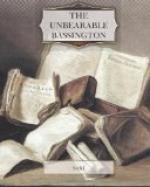was ill, which might have meant much or little; then
there had come that morning a cablegram which only
meant one thing; in a few hours she would get a final
message, of which this was the preparatory forerunner.
She already knew as much as that awaited message
would tell her. She knew that she would never
see Comus again, and she knew now that she loved him
beyond all things that the world could hold for her.
It was no sudden rush of pity or compunction that clouded
her judgment or gilded her recollection of him; she
saw him as he was, the beautiful, wayward, laughing
boy, with his naughtiness, his exasperating selfishness,
his insurmountable folly and perverseness, his cruelty
that spared not even himself, and as he was, as he
always had been, she knew that he was the one thing
that the Fates had willed that she should love.
She did not stop to accuse or excuse herself for
having sent him forth to what was to prove his death.
It was, doubtless, right and reasonable that he should
have gone out there, as hundreds of other men went
out, in pursuit of careers; the terrible thing was
that he would never come back. The old cruel
hopelessness that had always chequered her pride and
pleasure in his good looks and high spirits and fitfully
charming ways had dealt her a last crushing blow; he
was dying somewhere thousands of miles away without
hope of recovery, without a word of love to comfort
him, and without hope or shred of consolation she
was waiting to hear of the end. The end; that
last dreadful piece of news which would write “nevermore”
across his life and hers.
The lively bustle in the streets had been a torture
that she could not bear. It wanted but two days
to Christmas and the gaiety of the season, forced
or genuine, rang out everywhere. Christmas shopping,
with its anxious solicitude or self-centred absorption,
overspread the West End and made the pavements scarcely
passable at certain favoured points. Proud parents,
parcel-laden and surrounded by escorts of their young
people, compared notes with one another on the looks
and qualities of their offspring and exchanged loud
hurried confidences on the difficulty or success which
each had experienced in getting the right presents
for one and all. Shouted directions where to
find this or that article at its best mingled with
salvos of Christmas good wishes. To Francesca,
making her way frantically through the carnival of
happiness with that lonely deathbed in her eyes, it
had seemed a callous mockery of her pain; could not
people remember that there were crucifixions as well
as joyous birthdays in the world? Every mother
that she passed happy in the company of a fresh-looking
clean-limbed schoolboy son sent a fresh stab at her
heart, and the very shops had their bitter memories.
There was the tea-shop where he and she had often
taken tea together, or, in the days of their estrangement,
sat with their separate friends at separate tables.
There were other shops where extravagantly-incurred




